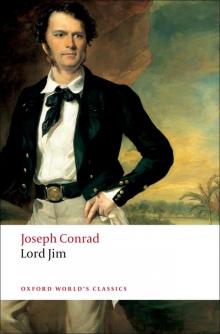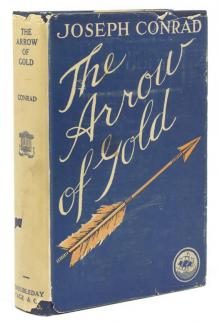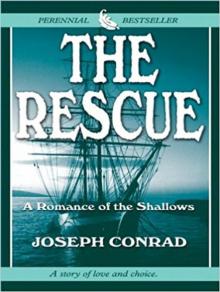- Home
- Joseph Conrad
Falk Page 3
Falk Read online
Page 3
His manner was usually odd it is true, and I certainly did not pay much attention to it; but that sort of obscure intention, which seemed to lurk in his nonchalance like a wary old carp in a pond, had never before come so near the surface. He had distinctly aroused my expectations. I would have been unable to say what it was I expected, but at all events I did not expect the absurd developments he sprung upon me no later than the break of the very next day.
I remember only that there was, on that evening, enough point in his behaviour to make me, after he had fled, wonder audibly what he might mean. To this Hermann, crossing his legs with a swing and settling himself viciously away from me in his chair, said: "That fellow don't know himself what he means."
There might have been some insight in such a remark. I said nothing, and, still averted, he added: "When I was here last year he was just the same." An eruption of tobacco smoke enveloped his head as if his temper had exploded like gunpowder.
I had half a mind to ask him point blank whether he, at least, didn't know why Falk, a notoriously unsociable man, had taken to visiting his ship with such assiduity. After all, I reflected suddenly, it was a most remarkable thing. I wonder now what Hermann would have said. As it turned out he didn't let me ask. Forgetting all about Falk apparently, he started a monologue on his plans for the future: the selling of the ship, the going home; and falling into a reflective and calculating mood he mumbled between regular jets of smoke about the expense. The necessity of disbursing passage money for all his tribe seemed to disturb him in a manner that was the more striking because otherwise he gave no signs of a miserly disposition. And yet he fussed over the prospect of that voyage home in a mail boat like a sedentary grocer who has made up his mind to see the world. He was racially thrifty I suppose, and for him there must have been a great novelty in finding himself obliged to pay for travelling—for sea travelling which was the normal state of life for the family—from the very cradle for most of them. I could see he grudged prospectively every single shilling which must be spent so absurdly. It was rather funny. He would become doleful over it, and then again, with a fretful sigh, he would suppose there was nothing for it now but to take three second-class tickets—and there were the four children to pay for besides. A lot of money that to spend at once. A big lot of money.
I sat with him listening (not for the first time) to these heart-searchings till I grew thoroughly sleepy, and then I left him and turned in on board my ship. At daylight I was awakened by a yelping of shrill voices, accompanied by a great commotion in the water, and the short, bullying blasts of a steam-whistle. Falk with his tug had come for me.
I began to dress. It was remarkable that the answering noise on board my ship together with the patter of feet above my head ceased suddenly. But I heard more remote guttural cries which seemed to express surprise and annoyance. Then the voice of my mate reached me howling expostulations to somebody at a distance. Other voices joined, apparently indignant; a chorus of something that sounded like abuse replied. Now and then the steam-whistle screeched.
Altogether that unnecessary uproar was distracting, but down there in my cabin I took it calmly. In another moment, I thought, I should be going down that wretched river, and in another week at the most I should be totally quit of the odious place and all the odious people in it.
Greatly cheered by the idea, I seized the hairbrushes and looking at myself in the glass began to use them. Suddenly a hush fell upon the noise outside, and I heard (the ports of my cabin were thrown open)—I heard a deep calm voice, not on board my ship, however, hailing resolutely in English, but with a strong foreign twang, "Go ahead!"
There may be tides in the affairs of men which taken at the flood…and so on. Personally I am still on the look out for that important turn. I am, however, afraid that most of us are fated to flounder for ever in the dead water of a pool whose shores are arid indeed. But I know that there are often in men's affairs unexpectedly—even irrationally—illuminating moments when an otherwise insignificant sound, perhaps only some perfectly commonplace gesture, suffices to reveal to us all the unreason, all the fatuous unreason, of our complacency. "Go ahead" are not particularly striking words even when pronounced with a foreign accent; yet they petrified me in the very act of smiling at myself in the glass. And then, refusing to believe my ears, but already boiling with indignation, I ran out of the cabin and up on deck.
It was incredibly true. It was perfectly true. I had no eyes for anything but the Diana. It was she, then, was being taken away. She was already out of her berth and shooting athwart the river. "The way this loonatic plucked that ship out is a caution," said the awed voice of my mate close to my ear. "Hey! Hallo! Falk! Hermann! What's this infernal trick?" I yelled in a fury.
Nobody heard me. Falk certainly could not hear me. His tug was turning at full speed away under the other bank. The wire hawser between her and the Diana, stretched as taut as a harpstring, vibrated alarmingly.
The high black craft careened over to the awful strain. A loud crack came out of her, followed by the tearing and splintering of wood. "There!" said the awed voice in my ear. "He's carried away their towing chock." And then, with enthusiasm, "Oh! Look! Look! sir, Look! at them Dutchmen skipping out of the way on the forecastle. I hope to goodness he'll break a few of their shins before he's done with 'em."
I yelled my vain protests. The rays of the rising sun coursing level along the plain warmed my back, but I was hot enough with rage. I could not have believed that a simple towing operation could suggest so plainly the idea of abduction, of rape. Falk was simply running off with the Diana.
The white tug careered out into the middle of the river. The red floats of her paddle-wheels revolving with mad rapidity tore up the whole reach into foam. The Diana in mid-stream waltzed round with as much grace as an old barn, and flew after her ravisher. Through the ragged fog of smoke driving headlong upon the water I had a glimpse of Falk's square motionless shoulders under a white hat as big as a cart-wheel, of his red face, his yellow staring eyes, his great beard. Instead of keeping a lookout ahead, he was deliberately turning his back on the river to glare at his tow. The tall heavy craft, never so used before in her life, seemed to have lost her senses; she took a wild sheer against her helm, and for a moment came straight at us, menacing and clumsy, like a runaway mountain. She piled up a streaming, hissing, boiling wave half-way up her blunt stem, my crew let out one great howl,—and then we held our breaths. It was a near thing. But Falk had her! He had her in his clutch. I fancied I could hear the steel hawser ping as it surged across the Diana's forecastle, with the hands on board of her bolting away from it in all directions. It was a near thing. Hermann, with his hair rumpled, in a snuffy flannel shirt and a pair of mustard-coloured trousers, had rushed to help with the wheel. I saw his terrified round face; I saw his very teeth uncovered by a sort of ghastly fixed grin; and in a great leaping tumult of water between the two ships the Diana whisked past so close that I could have flung a hair-brush at his head, for, it seems, I had kept them in my hands all the time. Meanwhile Mrs. Hermann sat placidly on the skylight, with a woollen shawl on her shoulders. The excellent woman in response to my indignant gesticulations fluttered a handkerchief, nodding and smiling in the kindest way imaginable. The boys, only half-dressed, were jumping about the poop in great glee, displaying their gaudy braces; and Lena in a short scarlet petticoat, with peaked elbows and thin bare arms, nursed the rag-doll with devotion. The whole family passed before my sight as if dragged across a scene of unparalleled violence. The last I saw was Hermann's niece with the baby Hermann in her arms standing apart from the others. Magnificent in her closefitting print frock she displayed something so commanding in the manifest perfection of her figure that the sun seemed to be rising for her alone. The flood of light brought out the opulence of her form and the vigour of her youth in a glorifying way. She went by perfectly motionless and as if lost in meditation; only the hem of her skirt stirred in the draught; the sun rays broke on her
sleek tawny hair; that bald-headed ruffian, Nicholas, was whacking her on the shoulder. I saw his tiny fat arm rise and fall in a workmanlike manner. And then the four cottage windows of the Diana came into view retreating swiftly down the river. The sashes were up, and one of the white calico curtains was fluttered straight out like a streamer above the agitated water of the wake.
To be thus tricked out of one's turn was an unheard of occurrence. In my agent's office, where I went to complain at once, they protested with apologies they couldn't understand how the mistake arose: but Schomberg when I dropped in later to get some tiffin, though surprised to see me, was perfectly ready with an explanation. I found him seated at the end of a long narrow table, facing his wife—a scraggy little woman, with long ringlets and a blue tooth, who smiled abroad stupidly and looked frightened when you spoke to her. Between them a waggling punkah fanned twenty cane-bottomed chairs and two rows of shiny plates. Three Chinamen in white jackets loafed with napkins in their hands around that desolation. Schomberg's pet table d'hote was not much of a success that day. He was feeding himself ferociously and seemed to overflow with bitterness.
He began by ordering in a brutal voice the chops to be brought back for me, and turning in his chair: "Mistake they told you? Not a bit of it! Don't you believe it for a moment, captain! Falk isn't a man to make mistakes unless on purpose." His firm conviction was that Falk had been trying all along to curry favour on the cheap with Hermann. "On the cheap—mind you! It doesn't cost him a cent to put that insult upon you, and Captain Hermann gets in a day ahead of your ship. Time's money! Eh? You are very friendly with Captain Hermann I believe, but a man is bound to be pleased at any little advantage he may get. Captain Hermann is a good business man, and there's no such thing as a friend in business. Is there?" He leaned forward and began to cast stealthy glances as usual. "But Falk is, and always was, a miserable fellow. I would despise him."
I muttered, grumpily, that I had no particular respect for Falk.
"I would despise him," he insisted, with an appearance of anxiety which would have amused me if I had not been fathoms deep in discontent. To a young man fairly conscientious and as well-meaning as only the young man can be, the current illusage of life comes with a peculiar cruelty. Youth that is fresh enough to believe in guilt, in innocence, and in itself, will always doubt whether it have not perchance deserved its fate. Sombre of mind and without appetite, I struggled with the chop while Mrs. Schomberg sat with her everlasting stupid grin and Schomberg's talk gathered way like a slide of rubbish.
"Let me tell you. It's all about that girl. I don't know what Captain Hermann expects, but if he asked me I could tell him something about Falk. He's a miserable fellow. That man is a perfect slave. That's what I call him. A slave. Last year I started this table d'hote, and sent cards out —you know. You think he had one meal in the house? Give the thing a trial? Not once. He has got hold now of a Madras cook—a blamed fraud that I hunted out of my cookhouse with a rattan. He was not fit to cook for white men. No, not for the white men's dogs either; but, see, any damned native that can boil a pot of rice is good enough for Mr. Falk. Rice and a little fish he buys for a few cents from the fishing boats outside is what he lives on. You would hardly credit it—eh? A white man, too.…"
He wiped his lips, using the napkin with indignation, and looking at me. It flashed through my mind in the midst of my depression that if all the meat in the town was like these table d'hote chops, Falk wasn't so far wrong. I was on the point of saying this, but Schomberg's stare was intimidating. "He's a vegetarian, perhaps," I murmured instead.
"He's a miser. A miserable miser," affirmed the hotel-keeper with great force. "The meat here is not so good as at home—of course. And dear too. But look at me. I only charge a dollar for the tiffin, and one dollar and fifty cents for the dinner. Show me anything cheaper. Why am I doing it? There's little profit in this game. Falk wouldn't look at it. I do it for the sake of a lot of young white fellows here that hadn't a place where they could get a decent meal and eat it decently in good company. There's first-rate company always at my table."
The convinced way he surveyed the empty chairs made me feel as if I had intruded upon a tiffin of ghostly Presences.
"A white man should eat like a white man, dash it all," he burst out impetuously. "Ought to eat meat, must eat meat. I manage to get meat for my patrons all the year round. Don't I? I am not catering for a dam' lot of coolies: Have another chop captain.… No? You, boy—take away!"
He threw himself back and waited grimly for the curry. The half-closed jalousies darkened the room pervaded by the smell of fresh whitewash: a swarm of flies buzzed and settled in turns, and poor Mrs. Schomberg's smile seemed to express the quintessence of all the imbecility that had ever spoken, had ever breathed, had ever been fed on infamous buffalo meat within these bare walls. Schomberg did not open his lips till he was ready to thrust therein a spoonful of greasy rice. He rolled his eyes ridiculously before he swallowed the hot stuff, and only then broke out afresh.
"It is the most degrading thing. They take the dish up to the wheelhouse for him with a cover on it, and he shuts both the doors before he begins to eat. Fact! Must be ashamed of himself. Ask the engineer. He can't do without an engineer—don't you see—and as no respectable man can be expected to put up with such a table, he allows them fifteen dollars a month extra mess money. I assure you it is so! You just ask Mr. Ferdinand da Costa. That's the engineer he has now. You may have seen him about my place, a delicate dark young man, with very fine eyes and a little moustache. He arrived here a year ago from Calcutta. Between you and me, I guess the money-lenders there must have been after him. He rushes here for a meal every chance he can get, for just please tell me what satisfaction is that for a well-educated young fellow to feed all alone in his cabin—like a wild beast? That's what Falk expects his engineers to put up with for fifteen dollars extra. And the rows on board every time a little smell of cooking gets about the deck! You wouldn't believe! The other day da Costa got the cook to fry a steak for him—a turtle steak it was too, not beef at all—and the fat caught or something. Young da Costa himself was telling me of it here in this room. 'Mr. Schomberg'—says he— 'if I had let a cylinder cover blow off through the skylight by my negligence Captain Falk couldn't have been more savage. He frightened the cook so that he won't put anything on the fire for me now.' Poor da Costa had tears in his eyes. Only try to put yourself in his place, captain: a sensitive, gentlemanly young fellow. Is he expected to eat his food raw? But that's your Falk all over. Ask any one you like. I suppose the fifteen dollars extra he has to give keep on rankling—in there."
And Schomberg tapped his manly breast. I sat half stunned by his irrelevant babble. Suddenly he gripped my forearm in an impressive and cautious manner, as if to lead me into a very cavern of confidence.
"It's nothing but enviousness," he said in a lowered tone, which had a stimulating effect upon my wearied hearing. "I don't suppose there is one person in this town that he isn't envious of. I tell you he's dangerous. Even I myself am not safe from him. I know for certain he tried to poison…."
"Oh, come now," I cried, revolted.
"But I know for certain. The people themselves came and told me of it. He went about saying everywhere I was a worse pest to this town than the cholera. He had been talking against me ever since I opened this hotel. And he poisoned Captain Hermann's mind too. Last time the Diana was loading here Captain Hermann used to come in every day for a drink or a cigar. This time he hasn't been here twice in a week. How do you account for that?"
He squeezed my arm till he extorted from me some sort of mumble.
"He makes ten times the money I do. I've another hotel to fight against, and there is no other tug on the river. I am not in his way, am I? He wouldn't be fit to run an hotel if he tried. But that's just his nature. He can't bear to think I am making a living. I only hope it makes him properly wretched. He's like that in everything. He would like to keep a decent table well
enough. But no—for the sake of a few cents. Can't do it. It's too much for him. That's what I call being a slave to it. But he's mean enough to kick up a row when his nose gets tickled a bit. See that? That just paints him. Miserly and envious. You can't account for it any other way. Can you? I have been studying him these three years."
He was anxious I should assent to his theory. And indeed on thinking it over it would have been plausible enough if there hadn't been always the essential falseness of irresponsibility in Schomberg's chatter. However, I was not disposed to investigate the psychology of Falk. I was engaged just then in eating despondently a piece of stale Dutch cheese, being too much crushed to care what I swallowed myself, let along bothering my head about Falk's ideas of gastronomy. I could expect from their study no clue to his conduct in matters of business, which seemed to me totally unrestrained by morality or even by the commonest sort of decency. How insignificant and contemptible I must appear, for the fellow to dare treat me like this—I reflected suddenly, writhing in silent agony. And I consigned Falk and all his peculiarities to the devil with so much mental fervour as to forget Schomberg's existence, till he grabbed my arm urgently. "Well, you may think and think till every hair of your head falls off, captain; but you can't explain it in any other way."

 Heart of Darkness
Heart of Darkness Lord Jim
Lord Jim The Nigger of the Narcissus (Echo Library)
The Nigger of the Narcissus (Echo Library) Victory (Dover Thrift Editions)
Victory (Dover Thrift Editions) Secret Agent
Secret Agent Nostromo
Nostromo Chance: A Tale in Two Parts
Chance: A Tale in Two Parts Youth
Youth Almayer's Folly
Almayer's Folly The Heart of Darkness and the Secret Sharer
The Heart of Darkness and the Secret Sharer The Arrow of Gold: A Story Between Two Notes
The Arrow of Gold: A Story Between Two Notes The Rescue: A Romance of the Shallows
The Rescue: A Romance of the Shallows The Point Of Honor: A Military Tale
The Point Of Honor: A Military Tale Tales of Unrest
Tales of Unrest Under Western Eyes
Under Western Eyes Gaspar Ruiz
Gaspar Ruiz A Set of Six
A Set of Six Heart of Darkness and the Congo Diary (Penguin Classics)
Heart of Darkness and the Congo Diary (Penguin Classics) Heart of Darkness and Selected Short Fiction
Heart of Darkness and Selected Short Fiction Typhoon
Typhoon Youth, a Narrative
Youth, a Narrative Tomorrow
Tomorrow The Arrow of Gold
The Arrow of Gold The Shadow Line: A Confession
The Shadow Line: A Confession The Rescue
The Rescue Victory (Echo Library)
Victory (Echo Library) The Brute
The Brute Romance
Romance A Personal Record
A Personal Record Lord Jim: A Tale
Lord Jim: A Tale Heart of Darkness and Selected Short Fiction (Barnes & Noble Classics Series)
Heart of Darkness and Selected Short Fiction (Barnes & Noble Classics Series) Within the Tides
Within the Tides The Secret Sharer and Other Stories
The Secret Sharer and Other Stories Falk
Falk Heart of Darkness and The Secret Sharer
Heart of Darkness and The Secret Sharer Chance
Chance An Anarchist
An Anarchist The Secret Agent: A Simple Tale
The Secret Agent: A Simple Tale The Secret Agent
The Secret Agent Complete Works of Joseph Conrad (Illustrated)
Complete Works of Joseph Conrad (Illustrated) Heart of Darkness and the Congo Diary
Heart of Darkness and the Congo Diary Notes on Life & Letters
Notes on Life & Letters Typhoon (Single Story)
Typhoon (Single Story)